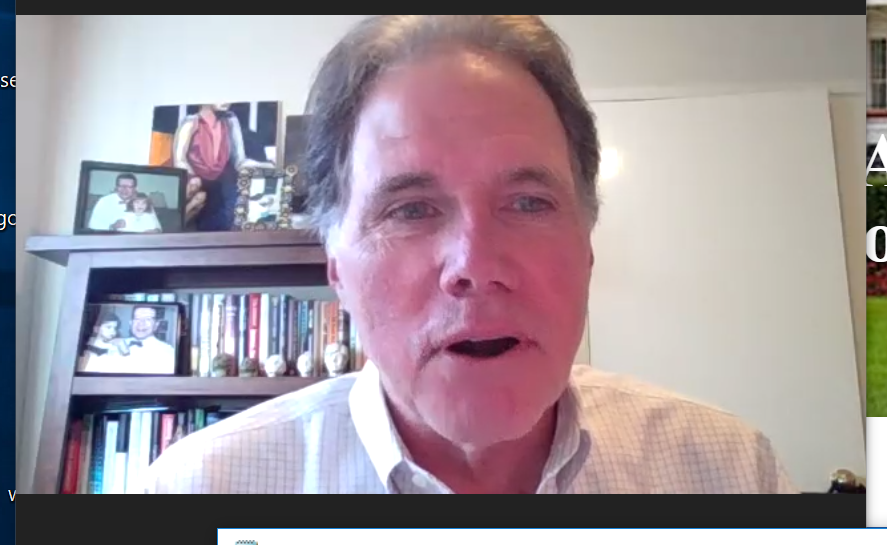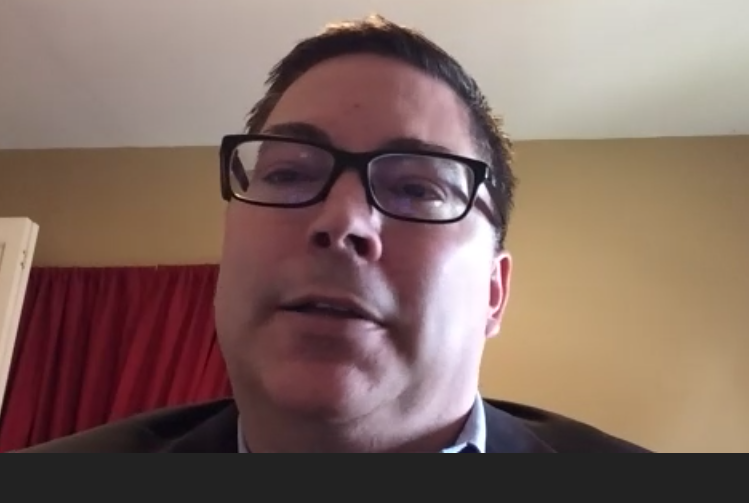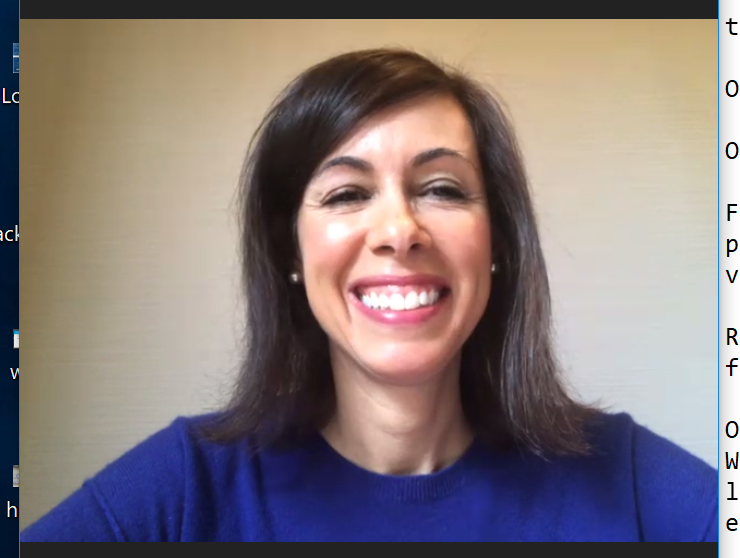Rosenworcel, O'Rielly Signal CTIA's 6 GHz Proposal Isn't Way to Go
The smarter way to stay on top of the multichannel video marketplace. Sign up below.
You are now subscribed
Your newsletter sign-up was successful
Democratic FCC commissioner Jessica Rosenworcel and Republican Michael O'Rielly are in agreement that the FCC needs to free up the 6 GHz spectrum band for unlicensed WiFi and 5G ASAP, but that with the current coronavirus crisis, that may not happen as soon as they would have liked.

They also are in agreement that a new wireless industry push to auction a portion of that 6 GHz spectrum for licensed use is not the way to go.
That came in a conversation with Michael Calabrese of New America's Open Technology Institute for a "Next Generation Wi-Fi: Heading Off a 5G Digital Divide with Affordable Connectivity for All" event that had to move online. There were occasional buffering issues during the streamed event (see photo), and the low-angle laptop views that are not the most flattering of headshots. But those only served as a reminder of a world where a real, rather than online, virus is requiring major changes in how we communicate. It did provide the event with a more intimate feel.
Priscilla Delgado Argeris from Facebook teed up the discussion by talking about how important it was to free up the 6 GHz spectrum, and as much as possible, for unlicensed wireless, which translates to the wireless broadband that is becoming a primary vehicle for internet access.
The FCC is currently working on such an item.
When it was their turn to weigh in, O'Rielly and Rosenworcel were clearly on the same page as to the importance of the spectrum being freed up for unlicensed, rather than licensed.

Asked by Calabrese if they supported the CTIA proposal to move incumbents in the upper part of the 6 GHz band to the 7 GHz band and auctioning that upper portion for licensed use, the commissioners generally agreed with cable operators that that process would take too much time to be feasible.
The smarter way to stay on top of the multichannel video marketplace. Sign up below.
Related: Conservatives Push for All 6 GHz to Be Freed Up For Unlicensed
O'Rielly said he would keep an open mind on the issue--the item has not been voted so he is expected not to pass any pre-judgments--and that he was mindful that wireless companies needed more license spectrum. But he also said that he did not believe CTIA's suggestion of moving 6 GHz incumbents, like utility companies, into the 7 GHz band, with its incumbent DOD users, was a viable option because he wasn't sure DOD would accept the new neighbors, and he had talked to utility companies who were more interested in making sharing with unlicensed users work.

O'Rielly said he would continue to listen to dialogue, and if something changes he would reconsider.
Rosenworcel agreed with her colleague. She signaled that if getting the spectrum to market quickly was important--which she has said it clearly is--10 years was too long.
The event was marked by unusual comedy between the commissioners who are often at odds over FCC policy, though unlicensed spectrum has been a unifying issue for them.

Rosenworcel thanks O'Rielly for his hard work, while O'Rielly returned the praise and even added efforts by former FCC chairman Tom Wheeler.
Calabrese asked Rosenworcel whether she thought the wireless industry would have been in better shape to handle the coronavirus distance-learning workload had the 6 GHz band already been freed up, she said absolutely. She also said that when the crisis has passed, the FCC should measure where broadband networks succeeded, and where they failed to do some of its own distance learning, which she said would probably include that the country needs more WiFi and the 6 GHz band is a good place to look.
Related: Broadcast, Cable Square Off Over 6 GHz
O'Rielly agreed there would be both positive and negative lessons learned, and the FCC would learn a lot and had a lot to do.
Calabrese pointed out that some folks have argued that with all the 6 GHz spectrum the FCC is planning to free up, it doesn't necessarily need the "marginal" 45 MHz in the 5.9 band it wants to reallocate from licenses connected car (V2V) uses (it is leaving 30 MHz clear for V2V).
O'Rielly immediately pushed back. He said that the 5.9 GHz spectrum is incredibly important, and that the car companies who continue to push for all 75 MHz are using problematic hyperbole to make their case. He said that the 5.9 spectrum could be repurposed almost immediately, while it would take more time for 6 GHz. He said he thought the auto industry was missing that.
Rosenworcel pointed to the "macro" issue of incumbent licensed spectrum users resisting effort to free up spectrum for unlicensed. That included government users who push back on any clearing or sharing of spectrum below 8 GHz, even as Congress has charged the FCC with finding more unlicensed spectrum. She suggested that spectrum NMBY problem was "as old as time," but needed fixing. That is because such recalcitrance can slow down innovation and, ultimately, the economy," she said, not having to expound on the inadvisability of doing anything more to slow the economy at the present time.
The issue was bigger than 5.9 GHz, she said, and needs to be addressed "at a higher level."
Contributing editor John Eggerton has been an editor and/or writer on media regulation, legislation and policy for over four decades, including covering the FCC, FTC, Congress, the major media trade associations, and the federal courts. In addition to Multichannel News and Broadcasting + Cable, his work has appeared in Radio World, TV Technology, TV Fax, This Week in Consumer Electronics, Variety and the Encyclopedia Britannica.

